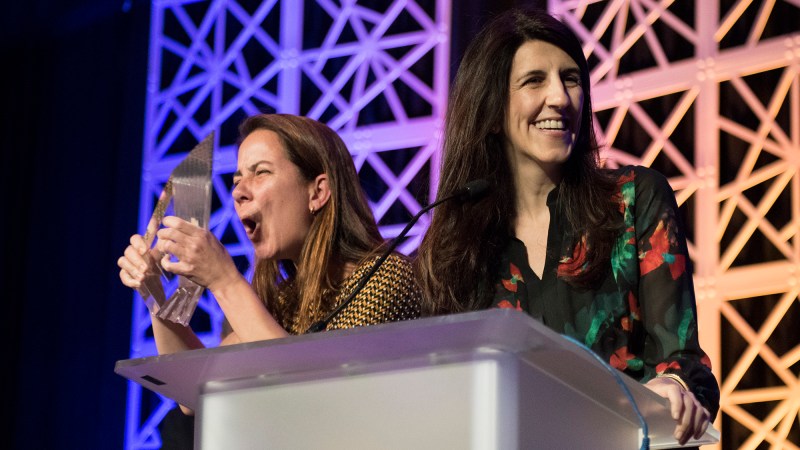Renata Rizzi celebrates with the Online Journalism Award crystal trophy as Paula Miraglia listens to applause from the crowd as they accepted the award for General Excellence in Online Journalism/Small for Nexo, Oct. 7, 2017. (Photo by Christian Monterrosa/ONA Student Newsroom)
The New York Times and The Globe and Mail led the pack at the Online Journalism Awards on Saturday night, with four awards each.
The Globe and Mail was recognized for general excellence and won an award for an interactive piece that pushed beyond the rhetoric around a $7.4 billion pipeline expansion. The Canadian national outlet also won two awards for a project that uncovered how Canadian police treat sexual assault cases and spurred a public policy overhaul.
“Its such an incredible honor to be recognized,” said Angela Pacienza, The Globe and Mail’s Head of Newsroom Development.
“We want to thank our readers,” she said in her acceptance speech. “We are a subscription publication, and they pay for our journalism and continue to pay for our journalism, and without them we wouldn’t be able to do the work that we do.”
The Times took home awards for stories focused on race, the tragedy of a mass shooting, an Olympian and the curious case of a bag of photo slides left behind in New York City.
Judges chose from 119 finalists to name winners in 37 categories, and 13 awards offered $58,500 in prize money. The Online News Association has given awards to more than 400 recipients over 17 years.
The Globe and Mail was recognized for general excellence in the large newsroom category, with the judges saying it was clear the newsroom was “firing on all cylinders.”
“We don’t do journalism to win awards, we do journalism to make change,” Globe and Mail Head of Presentation Matt Frehner told the Student Newsroom after the win.
All three general excellence awards honored international publications. Two-year-old Brazilian digital newspaper Nexo Jornal won the small newsroom category, and Swiss news outlet Le Temps won the medium category. Some 44 percent of conference-goers were from the United States at ONA17, according to data analyzed by the ONA Student Newsroom.
Four stories that received recognition took up issues related to President Donald Trump and the election. Boston NPR member station WBUR won in the planned news/medium category for its election 2016 coverage. ProPublica and the Electionland Coalition took home the planned news award for “Electionland,” a project to track and cover voting issues during the 2016 election. The judges called it “epic,” emcee Joshua Johnson said.
The Washington Post took home a topical reporting award for “Trump Charities,” reporter David Fahrenthold’s exhaustive look at the president’s philanthropic history — or lack thereof.
There were three winners in the Al Neuharth Innovation in Investigative Journalism Awards, which included a $4,000 prize. The Center for Public Integrity’s “Drinks, Dinners, Junkets and Jobs: How the Insurance Industry Courts State Commissioners” took home the prize in the small category.
The medium category went to “Toxic Armories” from the Oregonian and OregonLive, which uncovered why National Guard armories in the United States have high levels of lead contamination.
In the large category, The Globe and Mail’s “Unfounded” sexual assault investigation won its first award of the night for its ability to show the scope of a national problem and allow the reader to “localize it with ease,” Johnson said.
“Because of this reporting, thousands and thousands of sexual assault cases have been reviewed,” said Globe and Mail investigative reporter Robyn Doolittle. “There’s national changes to policy, police training and oversight, and that has been so incredibly rewarding. I’m so grateful to work at The Globe and Mail, a newsroom that not only gets behind this kind of reporting, but demands it.”
The OJAs added two new awards this year: Excellence in Immersive Storytelling and Audio Storytelling. FRONTLINE won the immersive storytelling award for its story “After Solitary.” Reveal from The Center for Investigative Reporting took home an audio storytelling award for its look into the feasibility of Trump’s border wall.
First Draft took home a planned news award for its CrossCheck France project that entailed collaboration among 37 French newsrooms and a handful of British newsrooms to combat misinformation around the French election.
The Intercept and First Look Media won an award in the Florida Awards in Investigative Data Journalism category with “Trial and Terror,” which found that most people prosecuted for terrorism since 9/11 never committed a violent act. Also in that category, The Globe and Mail took home another award for “Unfounded.” The winning organizations received a $7,500 prize.
STAT and Al-Monitor tied in the explanatory reporting category for “Game of Genomes” and “Middle East Lobbying: The Influence Game,” respectively. The judges said the projects took different approaches but were both “impressive feats of journalism,” Johnson said.
Shortly after, STAT tied again. The health and medicine-focused news site launched by the Boston Globe tied with The Intercept and First Look Media in the small newsroom features category. STAT won for “Dope Sick” about drug addiction. The Intercept was recognized for “AMERICA RELOADED: The Bizarre Story Behind the FBI’s Fake Documentary About the Bundy Family, The Intercept and First Look Media.” Mother Jones also won a features award for an undercover story, “My Four Months as a Private Prison Guard.”
“Readers are there to support serious in-depth journalism,” said Mother Jones Editor in Chief Clara Jeffrey. “We just have to figure out how to tell them what we’re doing and keep them apprised of the risks … that we take every day.”
The Knight Award for Public Service, the oldest-running OJA award, went to the Atlanta Journal-Constitution for “Doctors & Sex Abuse.” Two projects focused on race received awards. The Seattle Times took home the explanatory reporting award in the medium category for “Under Our Skin,” and The New York Times won the online commentary award for “Race/Related.”
“So much of how we think and talk about race is shaped by how we experience it in our daily lives,” said Julie Bloom, New York Times deputy national desk editor.
In sports, awards went to La Repubblica for “Francesco Totti King of Rome” and Berliner Morgenpost for a story on the 2016 Berlin Marathon.
Projects covering energy and oil pipelines received recognition — “Weigh Anchor” from The Globe and Mail took the explanatory reporting award in the large category, and Reveal (part of The Center for Investigative Reporting) and Inside Energy took won a topical reporting award for “Standing Rock and Beyond,” which covered the Dakota Access Pipeline protest.
On the student side, USC/JOVRNALISM and The Desert Sun won the pro-am student award for “Turning Tides: The Story of the Salton Sea.” The University of North Carolina at Chapel Hill’s School of Media and Journalism took home the David Teeuwen Student Journalism Award in the large category for “Cuba’s New Wave,” which chronicled the social, economic and political changes happening across the island.
“Students who are just starting their journalism major learned skills they never would have in the classroom,” said Lindsay Carbonell, lead web developer on the project.
Breaking news awards went to the Knoxville News Sentinel and USA Today for “Gatlinburg Fire” in the medium category and in the large category to The New York Times for its coverage of the Pulse Nightclub shooting in Orlando.
“The work we are being recognized for shows how our storytelling tools have expanded to help readers make sense of a senseless tragedy,” Bloom said.
Before the night was over, two journalists were honored with individual awards, both to standing ovations. Spirited Media Founder Jim Brady received the Rich Jaroslovsky Founder Award, and American photographer and conflict reporter Tara Todoas-Whitehill received the James Foley Award for Conflict Reporting
Todoas-Whitehill dedicated her award to the Frontline Freelance Register and called for the safety of all journalists, whether they are full-time staff, part-time staff, or freelancers.
“In our profession, we travel to places that would give other people pause, to say the least, and for many of us, we do so not because it’s thrilling but because we know that there are stories that need to be told,” Todoas-Whitehill said. “Truth matters.”
THE FULL LIST OF AWARDS
Planned News – Small
CrossCheck France, First Draft
Planned News – Medium
Planned News – Large
Electionland, ProPublica and the Electionland Coalition
The University of Florida Award for Investigative Data Journalism Small/Medium
Trial and Terror, The Intercept and First Look Media
The University of Florida Award for Investigative Data Journalism – Large
Online Commentary
Race/Related, The New York Times
Breaking News – Medium
Gatlinburg Fire, The Knoxville News Sentinel / USA TODAY NETWORK – TENNESSEE
Breaking News – Large
Knight Award for Public Service
Doctors & Sex Abuse, The Atlanta Journal-Constitution
Explanatory Reporting – Small (TIE)
Middle East Lobbying: The Influence Game, Al-Monitor
Explanatory Reporting – Medium
Under Our Skin, The Seattle Times
Explanatory Reporting – Large
Weigh Anchor, The Globe and Mail
Feature – Small (TIE)
Feature – Medium
My Four Months as a Private Prison Guard, Mother Jones
Feature – Large
The Fine Line, The New York Times
The David Teeuwen Student Journalism Award – Small
The David Teeuwen Student Journalism Award – Large
Cuba’s New Wave, The University of North Carolina at Chapel Hill’s School of Media and Journalism
Student Award – Pro-Am
Turning Tides: The Story of the Salton Sea, USC/JOVRNALISM and The Desert Sun
Rich Jaroslovsky, Special Presenter – 2017 Rich Jaroslovsky Founder Award
Jim Brady
Sports Category – Small/Medium
Berlin Marathon 2016 – How Fast Your City Runs, Berliner Morgenpost
Sports Category – Large
Francesco Totti King of Rome, La Repubblica
Topical Reporting – Small
Truckbeat, Localore: Finding America at WUOT
Topical Reporting – Medium
Standing Rock and Beyond, Reveal from The Center for Investigative Reporting and Inside Energy
Topical Reporting – Large
Trump Charities, The Washington Post
Excellence in Immersive Storytelling
Excellence in Audio Storytelling — Small
Frontier of Change, KNBA, AIR: Finding America
Excellence in Audio Storytelling — Large
The Wall, Reveal from The Center for Investigative Reporting
Al Neuharth Innovation in Investigative Journalism Award – Small
The Al Neuharth Innovation in Investigative Journalism Award – Medium
Toxic Armories, The Oregonian / OregonLive
The Al Neuharth Innovation in Investigative Journalism Award – Large
James Foley Award for Conflict Reporting
Tara Todras-Whitehill
Excellence and Innovation in Visual Digital Storytelling –Small
Excellence and Innovation in Visual Digital Storytelling – Medium
Excellence and Innovation in Visual Digital Storytelling – Large
Fragments of a Life: A Curbside Mystery, The New York Times
Gannett Foundation Award for Technical Innovation in the Service of Digital Journalism
Live Notifications, The Guardian US Mobile Innovation Lab
General Excellence – Small
General Excellence – Medium
General Excellence – Large






